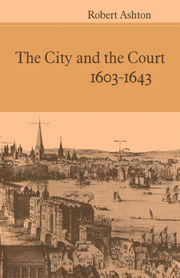Book contents
- Frontmatter
- Contents
- List of tables
- Preface and acknowledgements
- Note on dating, spelling and abbreviations
- Introduction
- 1 Institutions and oligarchy I: the municipal and business élites
- 2 Institutions and oligarchy II: gilds and companies
- 3 Big business and politics under James I
- 4 Big business and politics under Charles I
- 5 The crown and the municipality: local issues
- 6 The municipality and national issues
- 7 Conclusion
- Sources and bibliography
- Index
6 - The municipality and national issues
Published online by Cambridge University Press: 07 October 2011
- Frontmatter
- Contents
- List of tables
- Preface and acknowledgements
- Note on dating, spelling and abbreviations
- Introduction
- 1 Institutions and oligarchy I: the municipal and business élites
- 2 Institutions and oligarchy II: gilds and companies
- 3 Big business and politics under James I
- 4 Big business and politics under Charles I
- 5 The crown and the municipality: local issues
- 6 The municipality and national issues
- 7 Conclusion
- Sources and bibliography
- Index
Summary
The last two chapters have described the large number of serious inconveniences, irritations and frustrations experienced by the business and municipal élites of the City of London. But it might nevertheless be argued that even in the cases where the rôles of business concessionaire and City father were combined in the same person, the evidence, impressive though it may be, does not add up to irrefutable proof of their total alienation from the court, though it certainly goes a long way in that direction. For the principle of hierarchy, subordination and obedience was, after all, indivisible, and was it not better to grit one's teeth and submit uncomplainingly rather than risk the danger that disobedience to the king might spark off similar behaviour in one's own subordinates? The concluding pages of this book will be at pains to emphasize how powerfully such considerations operated as factors drawing the lord mayor and his colleagues towards support for the king and resistance to the policies of Pym and his associates in the autumn and winter of 1641–2. But it would be dangerous to read back the very exceptional circumstances of 1641–2 into previous decades, and if earlier chapters have demonstrated that business concessionaires and City fathers had perforce to yield to royal dictation in the 1630s, this was no more than recognition of a necessity which was accepted reluctantly but not without complaint and serious misgivings.
- Type
- Chapter
- Information
- The City and the Court 1603-1643 , pp. 177 - 200Publisher: Cambridge University PressPrint publication year: 1979

